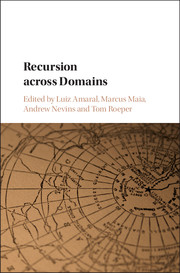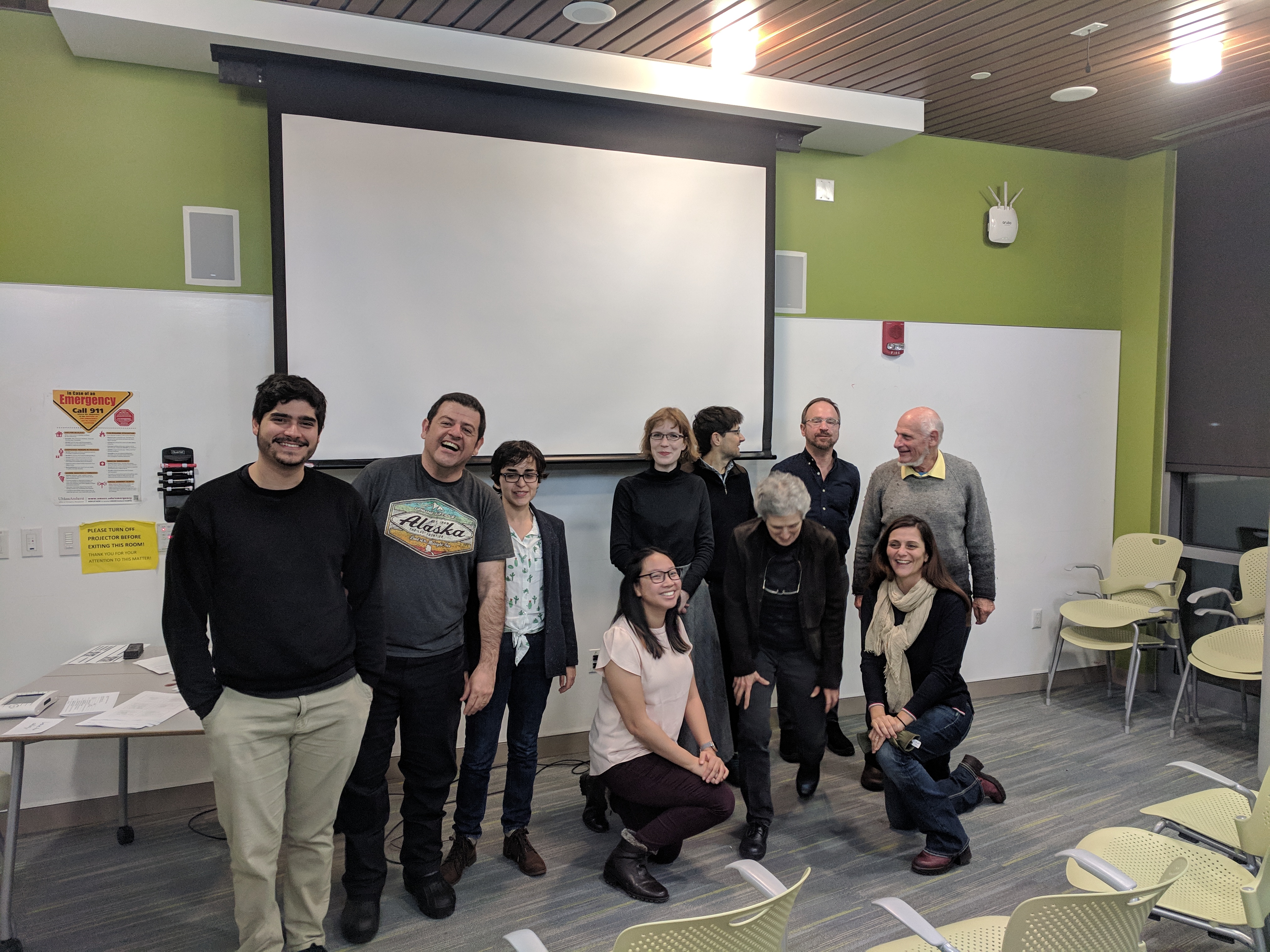Karen Jesney (PhD 2011) has accepted a tenure-track position in Language Acquisition at Carleton University. Congratulations Karen!
Category Archives: Acquisition
Syrett colloquium Fri. Feb. 22 at 3:30
Perkins colloquium Fri. Feb. 15 at 3:30
“Recursion across Domains” published by CUP

A book edited by Luiz Amaral, Marcus Maia, Andrew Nevins, and Tom Roeper on “Recursion across Domains” was recently published by Cambridge University Press. As Tom Roeper notes:
This book has a large UMass footprint — editors: Luiz Amaral, Tom Roeper — contributors include many former students, faculty and visitors: Suzi Lima, Bart Hollebrandse, Ana Perez, Uli Sauerland, Yohei Oseki, Terue Nakato, Rafael Nonato, Luiz Amaral, Tom Roeper
Summary: Recursion and self-embedding are at the heart of our ability to formulate our thoughts, articulate our imagination and share with other human beings. Nonetheless, controversy exists over the extent to which recursion is shared across all domains of syntax. A collection of 18 studies are presented here on the central linguistic property of recursion, examining a range of constructions in over a dozen languages representing great areal, typological and genetic diversity and spanning wide latitudes. The volume expands the topic to include prepositional phrases, possessives, adjectives, and relative clauses – our many vehicles to express creative thought – to provide a critical perspective on claims about how recursion connects to broader aspects of the mind. Parallel explorations across language families, literate and non-literate societies, children and adults are investigated and constitutes a new step in the generative tradition by simultaneously focusing on formal theory, acquisition and experimentation, and ecologically-sensitive fieldwork, and initiates a new community where these diverse experts collaborate
Table of Contents:
Foreword (Ian Roberts)
A Map of the Theoretical and Empirical Issues (Amaral, Maia, Roeper, & Nevins)
Speech Reports, Theory of Mind and Evidentials
- Sauerland, Uli. False speech reports in Piraha ?: A comprehension experi- ment
- Hollebrandse, Bart. Indirect recursion: the importance of second-order embedding and its implications for cross-linguistic research
- Correa, Let?cia M.S., Marina R. A. Augusto, Mercedes Marcilese & Clara Villarinho. Recursion in language and the development of higher order cognitive functions: an investigation with children acquiring Brazilian Portuguese
- Stenzel, Kristine. Embedding as a building block of evidential categories in Kotiria
- Thomas, Guillaume. Embedded imperatives in Mbya ?
Recursion along the Clausal Spine
- Rodrigues, Cilene, Raiane Salles, & Filomena Sandalo. Word order in control: evidence for self-embedding in Piraha ?
- Nonato, Rafael. Switch-reference is licensed by both kinds of coordina- tion: novel K?iseˆdjeˆ data
- Duarte, Fabio. Clausal recursion, predicate raising and head-finality in Teneteha ?ra
- Vieira,Marcia.Recursion in Tupi-Guaranilanguages:TheCasesofTupinamba ? and Guaran ??
Recursive Possession and Relative Clauses
- Terunuma, Akikio & TerueNakato.Recursive possessives in ChildJapanese
- Lima, Suzi, & Pikuruk Kaiabi. Recursion of possessives and locative phrases in Kawaiwete
- Amaral, Luiz. & Wendy Leandro. Relative Clauses in Wapichana and the interpretation of multiple embedded “uraz” Constructions
- Storto, Luciana, Karin Vivanco, & Ivan Rocha. Multiple embedding of relative clauses in Karitiana
Recursion in the PP Domain
- Roeper,Tom & YoheiOseki.Directstructuredrecursionintheacquisition path from flat to hierarchical structure
- Sandalo, Filomena, Cilene Rodrigues, Tom Roeper, Luiz Amaral, Marcus Maia & Glauber Romling. Self-embedded recursive postpositional phrases in Piraha ?: a pilot study
- Perez-Leroux, Ana T., Anny Castilla-Earls, Susana Bejar, Diane Massam & Tyler Peterson. Strong continuity and children’s development of DP recursion
- Franchetto, Bruna. Prosody and recursion in Kuikuro: DPs vs PPs
- Maia,Marcus,Anieli Franca, AlineGesualdi, AleriaLage, Cristiane Oliveira, Marije Soto & Juliana Gomes. The processing of PP embedding and co- ordination in Karaja ? and in Portuguese
LAWNE held Dec. 1 at UMass
LAWNE (Language Acquisitiion Workshop Northeast) held at UMass Dec. 1 brought together students and faculty from UMass, UConn and MIT where papers on ellipsis, null subjects, presuppositional too, recursion, math in language, and passives with methods from comprehension experimentation, naturalistic data, second language acquisition were all presented. A few of their authors gathered for a picture afterwards, shown below.
Tom Roeper quoted in the Atlantic
Via UMass news
Thomas Roeper, linguistics, says learning language from a special application on a smartphone isn’t quite the same as learning from a human teacher. He says a teacher can hold a student’s attention better and can tailor lessons to the individual’s talents. “There are all kinds of contextual factors in language learning. It would be hard for an app to take them all into account,” Roeper says. (The Atlantic, December 2018)
DELV Relaunch
From Tom Roeper
The Diagnostic Evaluation of Language Variation (DELV) was developed by a cooperative team from the Linguistics Department and Communications Disorders Dept in 2005. It is now being relaunched with a new publisher: Ventris. https://www.ventrislearning.com/delv/
This disorders test is designed to probe deep principles of grammar (long-distance wh-movement, wh-pairing, quantification, pragmatics, etc) without being biased against dialect speakers, particularly AAE speakers.
The DELV included many faculty from linguistics, beyond the authors Harry Seymour, Tom Roeper, and Jill deVilliers (to whom Peter deVilliers and Barbara Pearson have been added): Lisa Green, Lisa Selkirk, Peggy Speas, Angelika Kratzer, Joe Pater, and John Kingston were all involved in major and minor ways. In addition many students were involved: Bart Hollebrandse, Mike Dickey, Elena Benedicto, Deanna Moore (and I hope I have not forgotten anyone).
Nakato, Nelson and Roeper in China
Terue Nakato, Jon Nelson, and Tom Roeper had a paper “Overt Morphology Helps Children Recognize Recursion” at the Inauguration Ceremony of the Department of Linguistics at BLCU & International Forum on Frontiers in Linguistics in Beijing on October 30th. The program is available at the link.
Report from BUCLD
From Tom Roeper
BUCLD (Boston University Child Language Development) Nov 2-4 saw many students faculty and alumni come together as usual and with our traditional dinner Saturday night.
Call for papers: Brazilian Linguistics Association 50th Anniversary



